They are called pyrosomes and can be 60 ft in length.
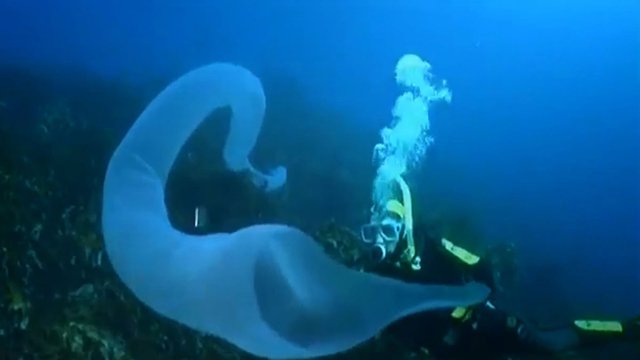
The ocean depths are filled with creatures that most of us have never seen before. But when there’s an organism that can grow up to the size of a sperm whale, we’re wondering how we’ve never heard of it before. It’s these giant hollow worm-like entities which have left us baffled and they are known as pyrosomes.
Pyrosomes
Pyrosomes are giant tubular beings which are actually made up of hundreds or thousands of animals called zooids. Zooids are multicellular but join together to form a colony. They have the ability to reproduce asexually and sexually, allowing the colony to expand rapidly. In pyrosomes, they join together to form this large alienesque gelatinous tube.
These tubes can be found in all shapes and sizes. Some are only a few centimetres long, while some have been found to grow up to 60 ft (18m) in length. Almost the size of a sperm whale!
Their presence has often spooked deep sea divers who’ve never encountered them before. In a BBC 2 production called Nature’s Weirdest Events, Presenter Chris Packham talks to a diver who encountered a gigantic pyrosome off the coast of Tasmania:
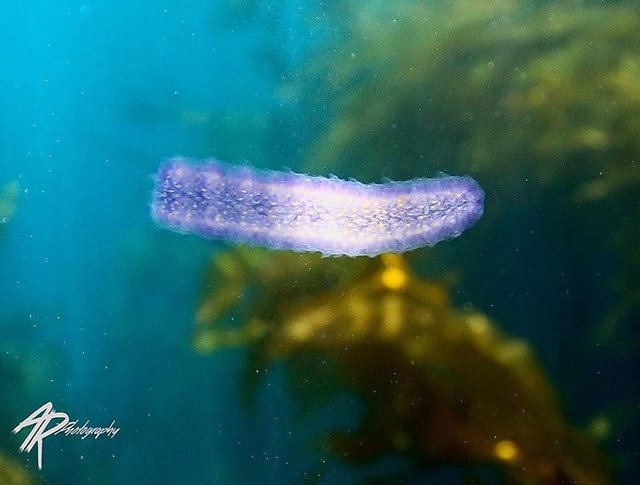
While swimming in the kelp forest off Catalina I was so excited to spot this pyrosome. The first one I've ever seen. These guys are basically a giant colony of smaller organisms, that can grow to massive sizes. They stay in the upper water column filter feeding on microscopic plant cells. Sadly moments after I made this image a kelp bass swam up and ate this one.
Photo: andrew.2.0/Instagram
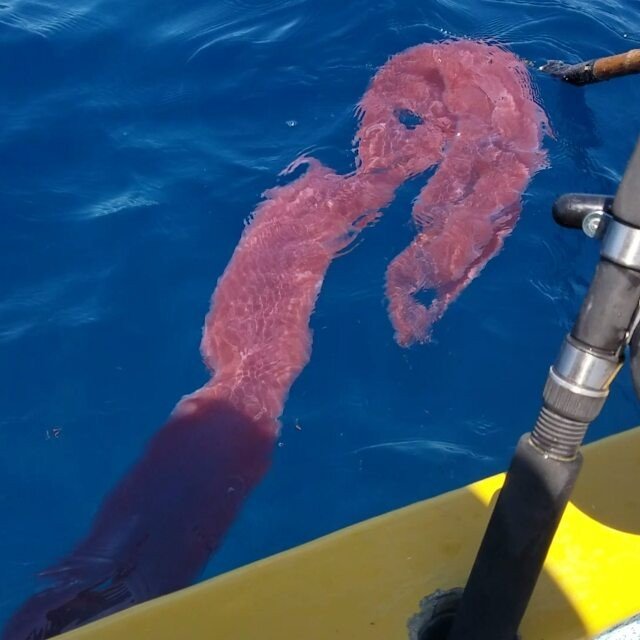
We found an unidentifiable sea creature today. Our fishing guides who go out on these waters every single day said they have never seen anything like this in all their years. What is it???
Photo: desert_resident/Instagram
People have likened their resemblance to plastic bags, giant eels and even feather bowers, as some have a ‘fluffy’ looking exterior. Up close you are able to see the hundreds and thousands of zooids within the structure:
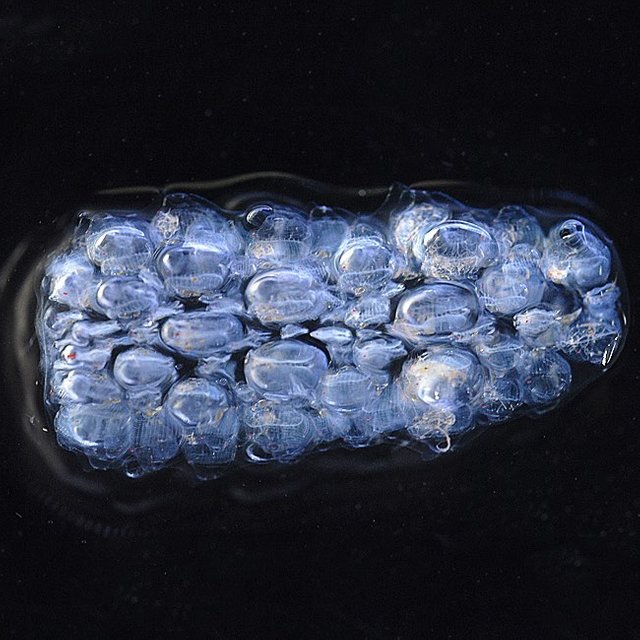
Looking like a collection of bubbles, this pyrosome (the name means "fire body") is a cylindrical colony, 7 centimeters (2.75 inch) long, made up of individual animal. Each tiny individual animal pumps water through its body, filtering out food and propelling the brightly luminescent colony forward. This pyrosome was collected during an expedition to the Celebes Sea, part of the "coral triangle", a region of thousands of islands where the Indian and Pacific Oceans meet and encompassing the Philippines, Indonesia, parts of Malaysia. and other nations. (Photo by Larry Madin)
Photo: woodshole_ocean/Instagram
Due to their appearance, a diamond-shaped squid egg mass is often mistaken for a pyrosome. Both have a hollow tubular structure, but upon inspection, you can see they do look quite different. The egg mass has a more speckled appearance and contains distinctive banding:
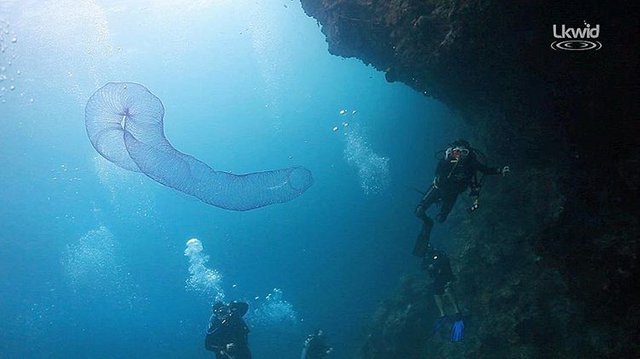
Rare sighting at Drop Off, Sipadan! This strange, alien-looking object was first thought to be a pyrosome, a colony of thousands of individual zooids, bound together in a cylindrical tunicate, so rare as to be called 'unicorn of the sea'. However, further digging on the internet revealed it to be a diamond-shaped squid (thysanoteuthis rhombus) egg mass! The two meter long egg mass is semi-transparent, with thousands of tiny purple dots arranged neatly side-by-side. A unicorn it might not be, but we think it's equally awesome! What other strange and rare creatures lurk just beyond sight in the waters of Sipadan?
Photo: lkwid/Instagram
Zooids
The zooids themselves filter feed. They suck in water, filter small particles and blow the waste back out. This action actually propels the colony. While the movement is very slow, according to New Scientist, when the zooids pause this process, the colony can sink 500-700 metres. This allows the pyrosome to move out of harm’s way and some have even been seen as far down as 3000 metres.
Another amazing adaptation is that the colony can glow when disturbed. Their bioluminescence is triggered when they brush past an object, but some have also suggested that it is light activated.
While a lot of things remain a mystery about these creatures, scientists are learning more about them every day. It’s just incredible to think how we’ve only just heard of them.
The wonders of the ocean!
This article was also published on our website: adaptnetwork.com
Follow us: @adaptnetwork (founded by @benadapt)
Join us on #steemSTEM
Thank you for this excellent science article, that we have advertised on our chat channel.
The steemSTEM project is a community-supported project aiming to increase the quality and the visibility of STEM (STEM is the acronym for Science, Technology, Engineering and Mathematics) articles on Steemit.
Downvoting a post can decrease pending rewards and make it less visible. Common reasons:
Submit
Awesome - thanks guys :D
Downvoting a post can decrease pending rewards and make it less visible. Common reasons:
Submit
Let's see if we can get a sperm whale to upvote my post!
Downvoting a post can decrease pending rewards and make it less visible. Common reasons:
Submit
Haha - I'm just a minnow at the moment but I upvoted your most recent post. Hope that helps :D
Downvoting a post can decrease pending rewards and make it less visible. Common reasons:
Submit
Legend!!! EDIT: Updated and resteemed this btw. Wait how do I resteem this?? V2 Figured it out.
Downvoting a post can decrease pending rewards and make it less visible. Common reasons:
Submit
Upvoted with my personal account as well :D
Downvoting a post can decrease pending rewards and make it less visible. Common reasons:
Submit
Thanks man! Let's take this to the moon!
Downvoting a post can decrease pending rewards and make it less visible. Common reasons:
Submit
crazy what our oceans bear! have a look at my last article there i'm stressing the importance of preserving our mother nature and the oceans in general :)
Downvoting a post can decrease pending rewards and make it less visible. Common reasons:
Submit
Thanks for your comment. I really liked your article - it was a great read on a very important topic.
Downvoting a post can decrease pending rewards and make it less visible. Common reasons:
Submit
This post received a 1.0% upvote from @randowhale thanks to @adaptnetwork! For more information, click here!
Downvoting a post can decrease pending rewards and make it less visible. Common reasons:
Submit
SPERM WHALE FOUND
Downvoting a post can decrease pending rewards and make it less visible. Common reasons:
Submit
Hi! I am a robot. I just upvoted you! I found similar content that readers might be interested in:
https://www.adaptnetwork.com/environment/wildlife/ocean-filled-with-giant-tubular-entities-that-grow-to-size-of-sperm-whale/
Downvoting a post can decrease pending rewards and make it less visible. Common reasons:
Submit
Very informative post sir.👍👍👍
Downvoting a post can decrease pending rewards and make it less visible. Common reasons:
Submit
Wow great Blog. I have never seen anything like this before. I don't know how that guy had the guts to touch it!
Downvoting a post can decrease pending rewards and make it less visible. Common reasons:
Submit
OMG, graboids come to mind
Downvoting a post can decrease pending rewards and make it less visible. Common reasons:
Submit
is there any harm from them ???
Downvoting a post can decrease pending rewards and make it less visible. Common reasons:
Submit
Hello @adaptnetwork!
What you've published is very nice to have a successful day.
I'm watching my profile, my profile is @toplider
Downvoting a post can decrease pending rewards and make it less visible. Common reasons:
Submit
These are now showing up in the PNW, often getting caught in fishermen's gear. Some concern about how it may affect the food chain. Weird!
Downvoting a post can decrease pending rewards and make it less visible. Common reasons:
Submit